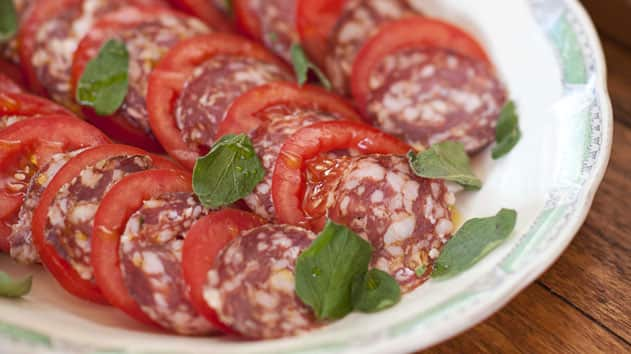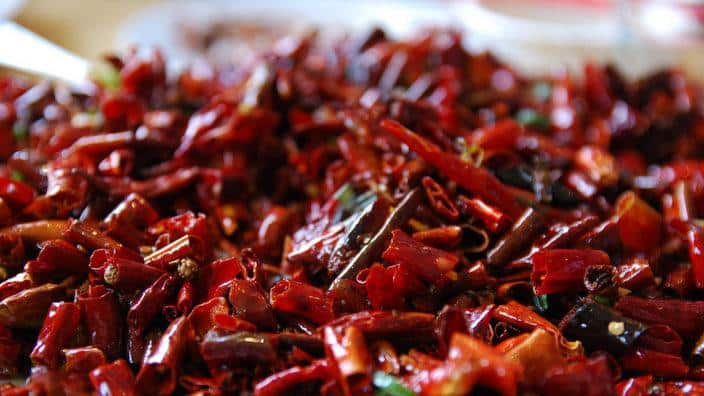

7 min read
This article is more than 7 years old
Feature
Can you really get cancer from food?
We look at five household beliefs linking cancer to food and examine the truth behind the statements.
Published
Updated
By Yasmin Noone
Image: Processed meats: do they come with a cancer warning? (E+/Getty Images)
Preservatives: do they give you cancer?
Preservatives were once our friends. Created to keep food fresher for longer, preservatives are added to food items to prevent them from spoiling. Some preservatives also add flavour and colour to foods.
But in 2015, the International Agency for the Research of Cancer (part of the World Health Organisation) classified two types of preservatives –nitrates and nitrites – found in food as ‘probably carcinogenic’.
In other words, these nitrates and nitrites commonly found in processed meats like bacon and salami might cause cancer in humans. According to Cancer Council NSW, nitrates and nitrites have been linked to bowel cancer, one of the most common cancers in men and women in Australia. But the risk depends on your exposure. If you eat kilos of bacon every day, your risk will skyrocket. If you eat processed meats rarely or in moderation, then the risk is minimal.
According to Cancer Council NSW, nitrates and nitrites have been linked to bowel cancer, one of the most common cancers in men and women in Australia. But the risk depends on your exposure. If you eat kilos of bacon every day, your risk will skyrocket. If you eat processed meats rarely or in moderation, then the risk is minimal.

Salami- okay in moderation or a cancer risk?
How can we be sure that even a small taste of salami won’t cause us cancer? Food Standards Australian and New Zealand (FSANZ) carries out safety assessments on food additives before they can be made available to consumers to ensure that they are safe and there is a jolly good reason to add them to your food items.
“All such food safety legislative controls in Australia mean that consumers can feel comfortable that the food products available in our country are not associated with an increased risk of cancer,” says Cancer Council NSW in a statement.
Red meat and bowel cancer
Before you believe a headline saying ‘red meat causes you cancer’, ask yourself: what kind of red meat?
If the answer is processed meats, please see above. If you are concerned about unprocessed red meat, say that chunky rump steak you want to eat for dinner or a lamb cutlet, keep reading!
The Cancer Council NSW’s position on unprocessed red meat is that it is “convincingly associated with a modest increased risk of bowel cancer”.
That’s why we are always being told to eat unprocessed red meat – beef, pork, lamb and veal – in moderation.
On the days where you aren’t having red meat, you can have chicken, fish or a meal with no meat in it. It’s not that hard to achieve a balance.
Kellie Bilinski, Accredited Practising Dietitian, advises that red meat is fine to eat if you have under the recommended amount of 700 grams per week, as part of a healthy diet full of vegetables.
“It’s a decent amount to consume if you think about it,” says the spokesperson for the Dietitians Association of Australia. “On the days where you aren’t having red meat, you can have chicken, fish or a meal with no meat in it. It’s not that hard to achieve a balance.”
READ MORE

Eat well: The risks of red meat
Soy and breast cancer
Some research says soy prevents breast cancer, while other sources online say it might cause it. So which one is it?
Isoflavone, a weak estrogen-like compounds found in plants, is also found in soy foods. Estrogen, in some women, has been found to promote the development, growth, and spread of breast cancers. Hence the fear – if you have breast cancer already, should you avoid eating a lot of soy or taking soy isoflavones as a dietary supplement?
Research published in Journal of the National Cancer Institute (2014) shows that in some women, consuming medium amounts of soy – about 52 grams of soy protein or four cups of soy milk – every day could turn on the genes that causes cancer to grow.
But, the study was only short-term so the researchers were unable to conclude whether the genetic changes actually caused the cancer to grow. The study says women shouldn’t avoid soy but instead, only eat it in moderation.
Another study published in the British Journal of Pharmacology in October last year suggests that phytoestrogens (plant oestrogens, found in soy products) could cause infertility and some types of cancer. But again, the results could not overtly say whether phytoestrogens helped or hindered women.

There are so many ways to eat/drink soy. But does it cause or prevent cancer? Source: Getty Images
If you are confused now, how about some more research saying that soy may or may not cause cancer? According to the Cancer Council, it’s thought that soy might lower breast and prostate cancer in some Asian countries, where soy is very common in the diet. But overall, there wasn’t enough evidence to suggest that high concentrations of soy in these countries or supplements that contain high doses of soy are effective in preventing cancer in people from Asia.
So basically, right now, there’s no one overwhelming piece of evidence, conducted over the long-term enough on a large enough sample that can conclusively predict the same impact of soy on every single woman’s body.
Sorry folks: the jury is still out on this one.
Do white grains cause cancer?
Earlier this year, a study was published in JAMA Oncology suggesting that diets high in foods causing inflammation – such as refined grains – could be linked to a higher risk of developing colon cancer. (The key word here is ‘could’.)
The researchers asked over 120,000 people what they ate every four years for 26 years. They found that those who ate inflammation-causing foods, white grains, soft drinks and red meat, were more likely to develop the cancer.
READ MORE

How I joined the cult of sourdough
The risk appeared to be higher among overweight or obese men and lean women and among men and women not consuming alcohol.
But despite the flashy headlines associated with the research promotion, the study could not show cause and effect, or isolate one specific food that heightened a person’s risk.
Hot, spicy foods prevent cancer

We know Sichuan chilli is powerful but can it prevent cancer? (Alpha - Flickr) Source: by Alpha - Flickr
The researchers looked at almost 500,000 Chinese adults and found that those who ate spicy foods at least once a week were 10-14 per cent less likely to die from health-related conditions than those who ate spicy food less often.
However, the study, published in the BMJ, says that more research is needed to draw wide-ranging conclusions about the impact of spicy food on the body as the findings were quite general and may not apply to people in other countries.
Cancer or no cancer: What should we eat?
You don’t need to make life difficult and be on an extreme detox diet or eliminate foods from your diet. Instead, just adopt a healthy lifestyle approach to eating.
Bilinski advises that Australians stick to a good old-fashioned diet, full of the five food groups. If they maintain a healthy weight, don’t smoke and don’t drink alcohol in excess and eat in moderation, then they are doing as much as they can to lower their cancer risk.
“People should focus on eating a healthy diet,” Bilinski says. “You can enjoy a glass of wine or eat barbecued meat…As long as you are not only having these foods, they aren’t likely to cause you cancer.
“You don’t need to make life difficult and be on an extreme detox diet or eliminate foods from your diet. Instead, just adopt a healthy lifestyle approach to eating.”
READ MORE

No. Detoxing isn't actually a thing
World Cancer Day
World Cancer Day falls on 4 February every year.
It offers a chance to raise awareness and reflect about what you can do to make a positive difference in the global fight against cancers - in all their forms.
Listen to our podcasts
You know pizza, pasta and tiramisu, but have you tried the Ugly Ducklings of Italian Cuisine?
Everybody eats, but who gets to define what good food is?
Get the latest with our SBS podcasts on your favourite podcast apps.
Watch SBS On Demand
Bring the world to your kitchen
Eat with your eyes: binge on our daily menus on channel 33.




